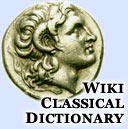
Friends and Enemies
This section is not comprehensive. I have no desire to find 1,000 links on each of these sub-topics.
Cast of characters | Philip and Olympias, parents | Hephaestion, friend and more | Roxane, wife | Darius III, Persian king | Diogenes, philosopher | Bucephalus, favorite horse | Aristander, seer | Other friends and allies | Other enemies and opponents | Genealogy
Cast of characters
Glossary (people and not) for Elizabeth Carney's Alexander the Great and Ancient Macedonia.
Livius: "Related subjects" (most are people), from the indefatigable Jona Lendering. I've included some his entries below, but not all.
Philip and Olympias, parents
Wikipedia: Olympias. Not large enough! Usual Wikipedia caveats apply.
Wikipedia: Philip II of Macedon. Usual Wikipedia caveats apply.
Reader's Companion to Military History: Philip II. Excellent long entry by Eugene N. Borza. See also
Macedonians and
![]()
Livius.org: Philip II and Olympias. Two lengthy articles by Jona Lendering.
![]() "Alexander, Olympias and the Regicide of Philip II" by Tracy Laird (from Michael Arnush's course
Alexander the Great).
"Alexander, Olympias and the Regicide of Philip II" by Tracy Laird (from Michael Arnush's course
Alexander the Great).
Pothos.org: Death of Philip: Murder or Assassination? by Sikander / Halil (collaborators). Detailed
Hephaestion, friend and more
Hephaistion - Philalexandros. Jeanne Reames-Zimmerman's deep exploration of Alexander's companion (and probable lover) Hephaestion. Includes a good examination of "
Was he really Alexander's Lover....? " Reames-Zimmerman is also known for the
Beyond Renault.
![]()
Wikipedia: Hephaestion. Usual Wikipedia caveats apply.
Roxane, wife
Wikipedia: Roxane. Usual Wikipedia caveats apply.
"The Story of Roxanne, the Greatest Love Story in the History of the World" by Sam Sloane.
Darius III, Persian king
Gaugamela.com: "King Darius III Codomannus, The Last Achaemenid Ruler" Nick Welman's Darius III universe. Goes way beyond detailed (and source) essays. It even has polls.
![]()
Wikipedia: Darius. Lengthy. Usual Wikipedia caveats apply.
Amazon. Darius dans l'ombre d'Alexandre by P. Briand.
Reviewed by Jan P. Stronk, BMCR (March 2004). Methological issues are at the forefront:
"Because practically all information on Darius has to be extracted from texts actually focusing on other subjects (predominantly Alexander), extracting it requires a strict methodological approach, executed with extreme precision. This process explains that writing on Darius, one necessarily has to write on Alexander as well: the story of Darius lies hidden in the shadow of Alexander."Also touches on Darius in non-western traditions:
"More or less like the "Roman d'Alexandre", both Sasanian and Islamic stories about the battle(s) between the Macedonian and Persian armies show a complete lack of understanding of, or even interest in, the actual occurrences before, during, or after Alexander's campaign, including Darius' death."
Diogenes, philosopher
Diogenes of Sinope. James Fieser from the Internet Encyclopedia of Philosophy (The University of Tennessee, Martin)
Wikipedia: Diogenes of Sinope.
Alexander meets Diogenes retold.
Pen and ink: Diogenes in his tub visited by Alexander by Arnold Houbraken (17th century)
Colored etching: Alexander and Diogenes (actually two dogs, but one's in a barrel) by Edwin Landseer (see here).
Illumination: Alexander and Diogenes, from a 15c. French translation of Curtius (British Library).
Painting: Alexander and Diogenes by John Martin (1789 - 1854).
Bucephalus, favorite horse
Pothos.org: The Legend of Bucephalus.
"Indomitable Man, Indomitable Horse" Alexander, from The International Museum of the Horse. Very brief. They have more on Xenophon "The Father of Classical Equitation".
Degas, Alexander and Bucephalus. Discussion and image (National Gallery of Art). Check out the details .
Web Archive: Bucephalus and Alexander the Great.
Aristander, seer
Wikipedia: Aristander of Telmessus. Alexander's seer. Without doubt, the best entry on Wikipedia.[1]
![]()
Other friends and allies
"Alexander and His Companions" by "Consul" B. John Zavrel, on Alexander's various official and unofficial "companions." I'm not sure where this is from.
Livius.org: Calanus by Jona Lendering. Lendering loses me when argues Calanus's reported final words ("Alexander, we shall meet again in Babylon") may have been some sort of mistranslation through Akkadian.[2]
Livius.org: Nearchus. Commander of Alexander's fleet, explorer and author.
Livius.org: Parmenion and Philotas.
Other enemies and opponents
![]() "The Enemies of Alexander the Great: The Importance of Alexander's Treatment of his Primary Antagonists throughout his Conquest" by Eric Fackler (from Michael Arnush's course
Alexander the Great). Twenty-six pages. Covers Darius, Porus and the city of Thebes.
"The Enemies of Alexander the Great: The Importance of Alexander's Treatment of his Primary Antagonists throughout his Conquest" by Eric Fackler (from Michael Arnush's course
Alexander the Great). Twenty-six pages. Covers Darius, Porus and the city of Thebes.
Wikipedia: Bessus. Usual Wikipedia caveats apply.
Genealogy
Web Archive: Genealogy of Alexander the Great (chart in Spanish, but easy to understand) from someone at the University of Navarra, Spain.
Notes:
- That's my story, and I'm sticking to it. (back)
- Calanus' words are fully explicable within the Greek historiographic tradition: (1) a detail is invented later on to prefigure something (Alexander's death generates these in spades); (2) quotes have little factual value, but are nearly always invented by ancient historian. This is hardly the time to run to an unlikely eastern explanation! (back)


Wiki Classical Dictionary, currently focused on Alexander
All material © 2000–2005 Tim Spalding.
Presented in Association with Amazon
If you enjoy this site you may also like these other sites by me:
Genghis Khan on the Web More than 275 links about the Mongol conqueror.
Cleopatra on the Web Over 410 resources on Cleopatra. Includes 168 images.
Ancient Library and the Wiki Classical Dictionray, major new reference sources for ancient studies.
Hieroglyphs! Over 125 links about Egyptian hieroglyphs for all ages and levels of knowledge.